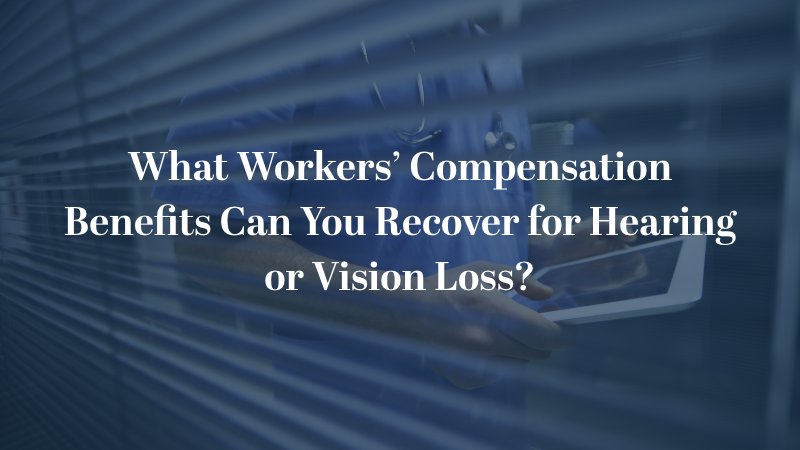

Maryland and Washington, D. C. workers who suffer hearing or vision loss due to work-related injuries or illnesses may recover workers’ compensation benefits, amounts of which are based on whether the disability is partial or total and whether it is temporary or permanent.
Temporary Total Disability
Injured workers in Washington, D. C. who are found to have a temporary total disability due to hearing or vision loss may receive two-thirds of their average salary for the 26 weeks prior to their injury, up to a statutory cap.
Temporary Partial Disability
Workers who have a temporary partial disability may receive two-thirds of the difference between their pre-injury and post-injury salaries.
Permanent Disability
Upon a treating doctor’s finding that the injured worker has reached maximum medical improvement, the worker may be considered permanently disabled, whether partially or totally. Such a worker can receive an award of two-thirds of their salary for a set number of weeks, which is based on the injured body part. For instance, the loss of an eye entitles an injured worker to an award of 120 weeks of salary.
Permanent Partial Disability
In the case of a permanent partial disability, the injured worker is entitled to a percentage of the weekly value assessed for the injury. If a worker with an injured eye was found to have a 30 percent loss of use of the eye, the worker would be entitled to an award of 36 weeks of salary (30 percent of 120).
In Maryland, workers found to have a temporary total disability based on hearing or vision loss may receive two-thirds of their average weekly salary up to a statutory cap that is tied to a percentage of the state’s average weekly salary, which is currently $1,080. Workers who are temporarily partially disabled may receive 50 percent of the difference between their pre-injury salary and their current salary.
A Maryland worker who reaches maximum medical improvement may be determined to be permanently disabled. If the disability is total, the worker may receive two-thirds of their average weekly salary, up to a statutory cap. The more serious the injury, the higher the cap. A worker who is permanently partially disabled may obtain an award reflecting the percentage of disability.
Workers Who Lose Both Eyes or Hearing in Both Ears are Permanently and Totally Disabled
In both Maryland and Washington, D.C., a worker who loses both eyes — or one eye and a leg, foot, arm or hand — would be presumed totally disabled. A worker who loses hearing in both ears — or hearing in one ear and a leg, foot, arm or hand — would likewise be presumed totally disabled.
Workers can also receive reimbursement for medical expenses related to the hearing or visual injuries and future treatment of those injuries.
How to File Workers’ Compensation Claim for Hearing or Vision Loss
Hearing or vision loss claims are treated with particular care under workers’ compensation law. Ensuring that the loss is directly related to workplace exposure or activity is the first step in the claims process. Here’s what you need to do o to file your claim:
Immediate Reporting
Employees must report their condition to their employer as soon as it is diagnosed. This report should be in writing, detailing the nature of the loss and any relevant circumstances that might point to the workplace as a significant contributing factor. Specifically, you must report the injury within 30 days.
Medical Documentation
Obtaining comprehensive medical documentation is a requirement. This includes a diagnosis from a qualified medical professional who specializes in hearing or vision loss. The medical report should explicitly link the hearing or vision loss to the claimant’s work environment or duties.
Official Claim Form Filing
The official claim for workers’ compensation must be filed with the District of Columbia’s Office of Workers’ Compensation. This involves completing the required forms, attaching the necessary medical evidence and any other documentation that supports the claim, such as reports of workplace noise levels in the case of hearing loss, or exposure to harmful agents that could affect vision.
Seek Legal Assistance
Given the complexities associated with workers’ comp claims, consulting with a legal professional experienced in workers’ compensation within the District of Columbia is advisable. An attorney can provide valuable guidance on how to structure your claim, ensure that all necessary documentation is provided, and help avoid common pitfalls that could delay or invalidate your claim.
Follow Through and Appeal if Necessary
After submitting your claim, it is vital to follow through with any requests for additional information or attend hearings if required. If your claim is denied, be prepared to appeal the decision. This again is a stage where legal advice is invaluable, ensuring that your appeal is timely and effectively presented.
By following these steps, individuals suffering from work-related hearing or vision loss in DC can navigate the process of filing a workers’ compensation claim more effectively, helping to secure the support and compensation they need.
Common Challenges and How to Overcome Them
Filing for workers’ compensation due to hearing or vision loss can be daunting, with various challenges that may arise during the process. Understanding these challenges and knowing how to overcome them can make a significant difference in the success of your claim. Here are some common obstacles and tips for navigating through them:
Uncooperative Employers
Sometimes, one of the biggest hurdles faced by claimants is dealing with employers who are uncooperative or hesitant to acknowledge work-related injuries leading to hearing or vision loss.
- Documentation is Key: Always document your interactions with your employer regarding your condition and efforts to file a claim. This could include emails, letters, or notes from meetings.
- Seek Legal Help: An experienced workers’ compensation attorney can be a formidable ally in dealing with uncooperative employers, leveraging legal expertise to ensure your rights are protected.
Insurance Company Delays
Dealing with insurance company delays can be one of the most frustrating aspects of filing a workers’ compensation claim for hearing or vision loss.
- Stay Organized: Keep meticulous records of all submitted documents and correspondences with the insurance company. This will be invaluable if you need to prove that delays are unwarranted or to challenge any denials.
- Follow Up Regularly: Regular follow-ups can help keep your claim on track. It also shows the insurance company that you are vigilant about your case.
Make Sure You Understand The Process
Familiarize yourself with the workers’ compensation process in your jurisdiction. Understanding the timeline, required forms, and other legal requirements can be beneficial. By being prepared and proactive, you can better manage these challenges and improve your prospects for securing the compensation you deserve for your work-related hearing or vision loss.
An experienced workers’ compensation lawyer in Washington D.C. can help a sight- or hearing-impaired worker obtain the benefits to which he or she is entitled. Lightfoot Law, PLLC in Washington, D.C. handles workers’ compensation claims in Maryland and the D. C. area. To schedule a free initial consultation, call us at 202-919-5453 or contact us online.